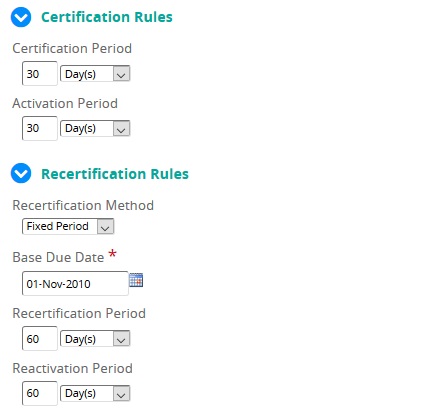
Fixed Period recertification example
The following sample illustrates how the Base Due Date defines a recursive cycle of recertification due dates based on the defined fixed date. Consider the following recertification settings in a qualification.

With a Base Due Date starting on 01 Nov 2010, the following provides an example of a time line of the Base Due Dates that this Fixed Period recertification rule will be for a user who becomes a member of this qualification on June 1 2011. The user would be required to certify on or before 01 July 2011, 30 days after membership. If this user then completed his initial certification on 30 June 2011, their next due date (recertification due date) would be 01 Nov 2011:
Fixed Base Due Date |
Reactivation |
Required |
Next Fixed |
Description |
01 July 2011 |
01 Aug 2011 |
01 Aug 2010 |
01 Nov 2011 |
This is the first base period that any existing users would begin their recertification, if they became a member of this Qualification any time between 01 Aug 2010 and 01 Aug 2011 |
With a current due date of 01 Nov 2011, this user must recertify on or after 01 Aug 2011 (current Fixed Period Reactivation Date) and before 01 Aug 2012 (next Fixed Period Reactivation Date). If this user then completed his recertification on 28 October 2011, their next due date (Fixed Period Recertification Due Date) would be 01 Nov 2012: |
||||
Fixed Base Due Date |
Reactivation |
Required |
Next Fixed |
Description |
01 Nov 2011 (1 year after Base Due Date) |
01 Aug 2011 (60 days before current Due Date) |
01 Aug 2011 01 Aug 2012 |
01 Nov 2012 (1 year after Current Due Date) |
This is the second base period calculated based on a user completing recertification anytime within the Required Mastery Range |
Required Mastery Range is defined as any date that falls between the Current Reactivation Date for one base period and the Reactivation Date for the Next Fixed Base Due Date
Consider the following Qualification Certification settings:

The following table provides a timeline for a new student user who becomes a member of this Qualification Certification for the first time on 08 Feb 2011:
Current Date |
Mastery Date |
Fixed Base |
Status |
Description |
|---|---|---|---|---|
08 Feb 2011 |
--- |
10 Mar 2011 |
NOT MET |
Initial status for this user when hired on 08 Feb 2011 would be NOT MET. They would have until 10 Mar 2011 (30 days) to complete their first certification |
28 Feb 2011 |
28 Feb 2011 |
01 May 2011 |
MET |
User MET the certification and is now required to recertify on the next Recertification Base Due Date, 01 May 2011. They completed their initial certification within the Required Mastery Range of 01 Jan 2011 and 31 Mar 2011. |
01 Jul 2011 |
28 Feb 2011 |
01 May 2011 |
EXPIRED |
This student user is now EXPIRED as they have not mastered their Recertification within the Required Mastery Range for the Base Due Date (31 Mar 2011 and 01 Jul 2011) |
15 Aug 2011 |
15 Aug 2011 |
01 Nov 2011 |
MET |
This student user then completes the recertification late. Their mastery date is within the Required Mastery Range for the 01 Aug 2011 Fixed Base Due Date, so their next Due Date becomes 01 Nov 2011. |
01 Oct 2011 |
01 Oct 2011 |
01 Feb 2012 |
MET |
This student user now completes the recertification within the Required Mastery Range for their current Due Date of 01 Nov 2011, so their next Due Date becomes 01 Feb 2012. |
01 Feb 2012 |
01 Oct 2011 |
01 Feb 2012 |
EXPIRED |
This student user is now EXPIRED as they have not mastered their Recertification within the Required Mastery Range for the Base Due Date (01 Oct 2011 01 Jan 2012) |
10 Jul 2012 |
10 Jul 2012 |
01 Nov 2012 |
MET |
This student user then completes the recertification late. Their mastery date is within the Required Mastery Range for the 01 Aug 2012 Fixed Base Due Date, so their next Due Date becomes 01 Nov 2012. |
| ©2021 SilkRoad Technology. All rights reserved. |
| Last modified on: 8/26/2020 12:31:27 PM |